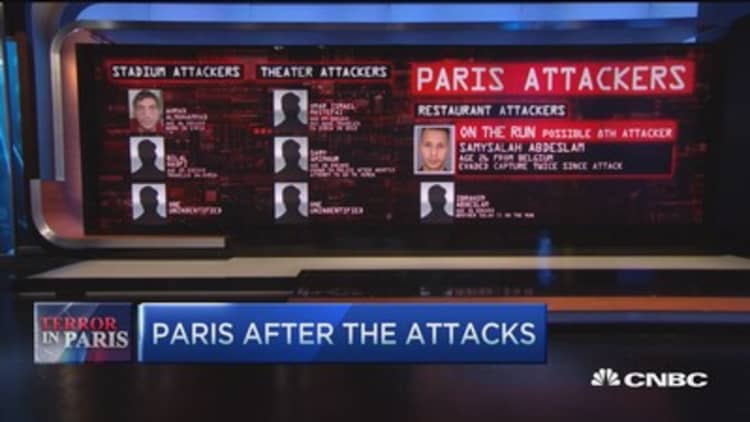Investigations into Friday's deadly attacks in Paris have focused attention on Belgium, a small European country that is now emerging as a breeding ground for Islamic extremism.
At least three of the men now linked to the Paris attacks have been identified as citizens or former residents of Belgium, including 27-year-old Islamic state fighter Abdelhamid Abaaoud who is believed to have coordinated and ordered the attacks from Syria.
That's alongside Brahim Abdeslam who the French judiciary said blew himself up at the Comptoir Voltaire cafe, and his brother, Salah Abdeslam who is still at large, and now the target of an international manhunt.
A United Nations working group just last month released a report calling for a national plan to help tackle the high number of fighters — last tallied at 500 — that are making their way from Europe to the frontlines of Syria and Iraq.
"The number of Belgian foreign fighters is reportedly the highest in Europe per capita among those travelling to join conflicts abroad," human rights expert Elżbieta Karska said in the report's press release.
Radical settlement
Bilal Benyaich, a senior fellow at Belgian think tank the Itinera Institute, told CNBC that the settlement of ultra-conservative Islamic Salafists hailing from Saudi Arabia in the 1970s, as well as those with ties to the Muslim Brotherhood who settled in Belgium throughout the 1980s and 1990s, are partly to blame for stoking the coals of Belgian extremism.
A small number of those migrants forged links with transnational networks and later attacks in their home countries, Benyaich explained. Others later left Belgium to join the battles in Syria and Iraq alongside groups like Islamic State once the Syrian war broke out, turning against western states which subsequently launched regional military interventions.
In fact, Belgium became one of the first European countries to see a fighter launch an attack upon their return from the Middle East, Florian Otto, the head of Europe and Central Asia at risk analysis group Verisk Maplecroft explained, referring to the Jewish Museum shootings that claimed four lives in Brussels last year.

Both Beyaich and Otto explained that Belgium is partly at fault for failing to integrate migrant communities. Poor socio-economic prospects, alongside perceived and real discrimination, helped isolate and put vulnerable youth at risk of radicalization.
Molenbeek, a district of the Belgian capital Brussels that's been targeted by police raids in the wake of the Paris attacks, last recorded unemployment rates nearing 30 percent, according to the latest statistics posted by Brussels Institute of Statistics and Analysis.
"It's a really dangerous cocktail of poverty, and a wide ranging architecture of radical Islamic organization...These neighborhoods have people who never even went to the Brussels city center. They are attached to chat rooms and Facebook, in contact with some of the most radical (groups),"Benyaich said.
Furthermore, Belgium's radical Islamic scene has provided a support structure for French extremists, who have traditionally skipped the border to evade surveillance at home. They are also more able to blend in thanks to the shared language, Otto said. However, with a greater focus on intelligence-sharing in the wake of the Paris attacks, that could change.
Benyaich stressed that extremists comprise a very small proportion of the Muslim community in Belgium, but warned that lawmakers should launch a comprehensive strategy to tackle radicalization while the problem is relatively manageable. This would require cooperation with social services, education, the judicial system and police force, as well as a realistic foreign policy, he said.
"We need a paradigm shift," Benyaich said. "If they wait too long, if the situation in Middle East deteriorates, it will be even worse."


